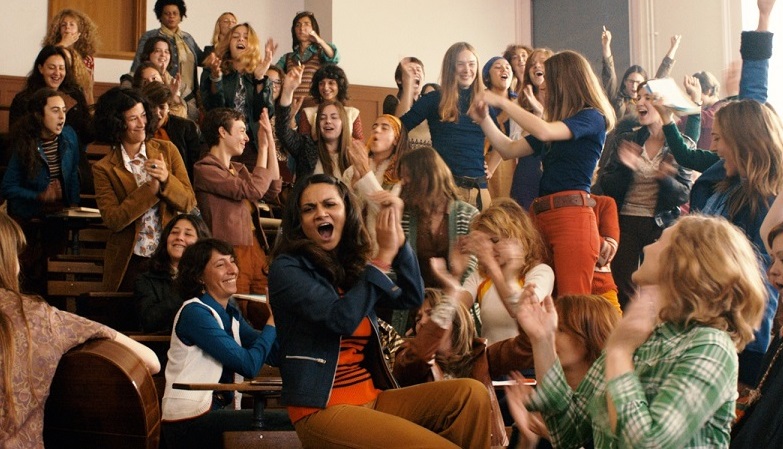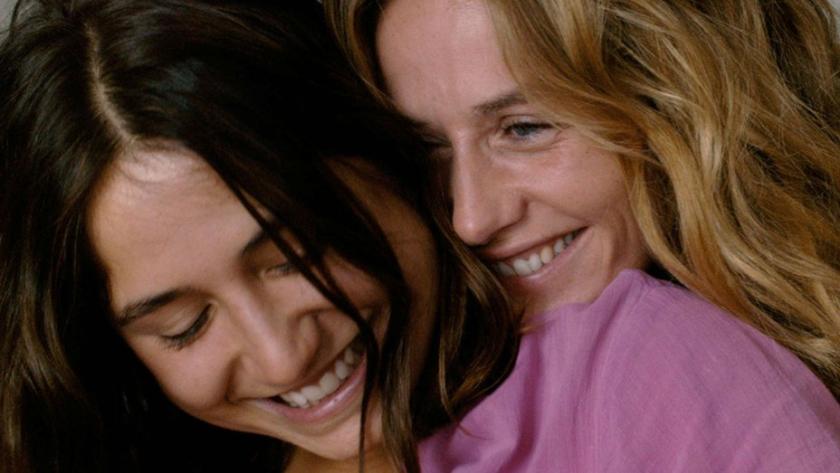Set at the beginning of the 1970s, Catherine Corsini’s Summertime (La belle saison) is a story of love in a political climate, one in which the post-1968 assertions of a changing society have infused the public context in theory but do not ultimately translate into liberation for the film’s two lead women characters. The restrictions of tradition, especially in the rural world in which the greater part of Summertime is set, finally prove too strong for their relationship.
Delphine (Izïa Higelin) has grown up on the land, the only child of smallholders in Limousin: it’s a beautiful, sparsely populated landscape, but a life of hard work and long days, especially at harvest time, when the women work alongside the men as equals but don’t question their secondary role in everything else. Delphine seems to be a natural part of that world – the land is in her blood, she’s at home on the back of a tractor – but it’s a conservative environment where her feelings for her own sex are an anomaly. A laconic early scene makes this clear when she steals away for a tryst with a girlfriend, only to be told that the relationship is over: the other woman is getting married, and everything else before that has been just a dalliance. It’s a society that can’t countenance the idea of living differently, and Delphine’s parents have long been dropping hints about how she’s getting on with Antoine, the friend she’s grown up with since childhood who, by the expectations of this world, would become her husband.
There's a sense of a plentiful repast that somehow doesn’t quite sate the appetite But Delphine is obviously determined to try for something else. The next time we see her, she has moved to Paris and found a job, living in an attic bedsit. We never quite learn what has pushed her to leave home, but she’s soon caught up in the lively company of a group of young women who, inspired by a sense of social change in the air, are asserting their rights, protesting their independence of men on principle, as well as around issues such as the right to abortion and contraception. It’s a world of group meetings, either energetic mass gatherings in lecture halls (pictured below) or discussions in flats, where issues are argued out and allegiances pledged.
It brings Delphine into contact with the outgoing, confident Carole (Cécile de France), who’s from another world, and, in her mid-thirties, a decade or so older then Delphine. She’s a teacher (of Spanish, suggesting an awareness of a wider world), living happily with a colleague, Manuel, in a relationship that meets all the standards of equality endorsed by their time and environment. But Delphine, for all her slight gaucheness in this big city company, is certain of her attractions, while Carole perhaps surprises herself by reciprocating them, and her feelings grow into something stronger, enough to disrupt the easy fluency of her home life.
 But the chance for the two women to develop a life together in Paris is itself disrupted when Delphine’s father suffers a stroke. Her return home is somehow more than just a homecoming: it’s also an unquestioning reversion to the daily tasks of the farm which just have to be attended to, and which her mother (Noémie Lvovsky, reserved, but a severe presence, pictured below) can’t manage on her own. Delphine has brought with her from Paris a new independence of spirit that allows her to take her father’s place in the surrounding farming community, hitherto an exclusively male preserve.
But the chance for the two women to develop a life together in Paris is itself disrupted when Delphine’s father suffers a stroke. Her return home is somehow more than just a homecoming: it’s also an unquestioning reversion to the daily tasks of the farm which just have to be attended to, and which her mother (Noémie Lvovsky, reserved, but a severe presence, pictured below) can’t manage on her own. Delphine has brought with her from Paris a new independence of spirit that allows her to take her father’s place in the surrounding farming community, hitherto an exclusively male preserve.
Corsini’s script, co-written with Laurette Polmanss, catches the subtle nuance that Delphine can break the established order in that world of work, but struggles to do so in the much more vital realm of her private life: Carole’s extended visit, for all the happiness of their time together through the summer, involves a subterfuge that is dramatically bound to break. Carole’s attempts to break down the boundaries existing between herself, as the outsider, and Lvovsky’s character never quite come to anything, as the latter remains too trapped in her world to allow the possibility of her daughter’s relationship to defy taboo.
 That trio of central relationships is well established, while the pairing of Higelin and de France works beautifully as a converging, on one level, of opposites, expressed in the physical difference between the actresses. Delphine is dark, almost stocky, close to the earth, reticent with words; Carole, tall, light, voluble, a creature more of the air: their sexual intimacy is shown with an openness that never shocks (even when you take in to account its early-Seventies setting), with an ease of connection that they perhaps never quite achieve elsewhere in the relationship. Corsini adds a coda that, while dramatically somewhat predictable, brings home the sense that the changes announced by the Sixties would take longer to work through in society than at first expected. There’s a sense that the relationship between the two women may have happened in the summertime season of the film’s English-language title, but not in the belle saison, at the right time, of the original.
That trio of central relationships is well established, while the pairing of Higelin and de France works beautifully as a converging, on one level, of opposites, expressed in the physical difference between the actresses. Delphine is dark, almost stocky, close to the earth, reticent with words; Carole, tall, light, voluble, a creature more of the air: their sexual intimacy is shown with an openness that never shocks (even when you take in to account its early-Seventies setting), with an ease of connection that they perhaps never quite achieve elsewhere in the relationship. Corsini adds a coda that, while dramatically somewhat predictable, brings home the sense that the changes announced by the Sixties would take longer to work through in society than at first expected. There’s a sense that the relationship between the two women may have happened in the summertime season of the film’s English-language title, but not in the belle saison, at the right time, of the original.
Cinematography by Jeanne Lapoirie catches the contrast between the two women nicely, and relishes the summer landscapes in the country (arguably, a tad too much), while a score by Grégoire Hetzel is similarly balmy, the influence of Michael Nyman-style piano occasionally pronounced. It’s all accomplished in a way characteristic of French cinema, a plentiful repast that doesn’t quite sate the appetite. Corsini avoids any sense of a tragic dimension in the conclusion of her film: to have added one might have been predictable, too – enough hints of Hardy already? – but Summertime somehow leaves a sense of something that’s not quite at fruition.
Overleaf: watch the trailer for Summertime















Add comment